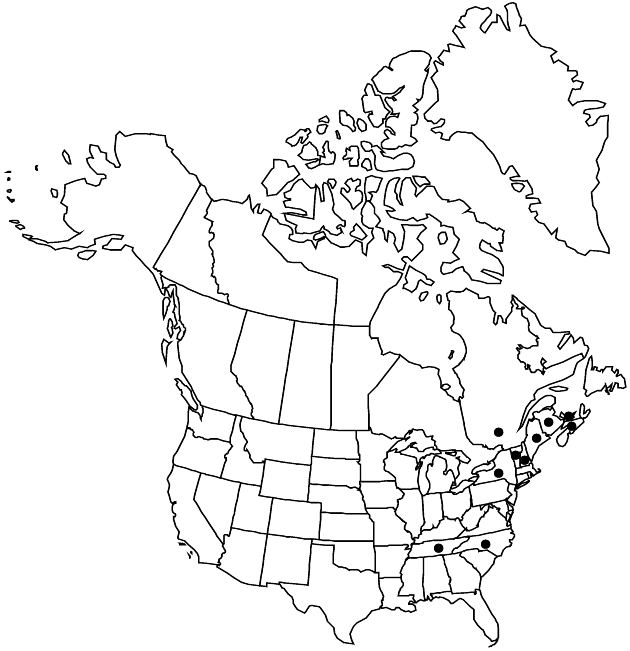Difference between revisions of "Packera schweinitziana"
Phytologia 49: 48. 1981.
FNA>Volume Importer |
FNA>Volume Importer |
||
| Line 15: | Line 15: | ||
|name=Senecio aureus var. lanceolatus | |name=Senecio aureus var. lanceolatus | ||
|authority=Oakes ex Torey & A. Gray | |authority=Oakes ex Torey & A. Gray | ||
| − | }}{{Treatment/ID/Synonym | + | }} {{Treatment/ID/Synonym |
|name=Senecio robbinsii | |name=Senecio robbinsii | ||
|authority=Oakes ex Rusby | |authority=Oakes ex Rusby | ||
| Line 33: | Line 33: | ||
|elevation=100–1800 m | |elevation=100–1800 m | ||
|distribution=N.B.;N.S.;P.E.I.;Que.;Maine;N.H.;N.Y.;N.C.;Tenn.;Vt. | |distribution=N.B.;N.S.;P.E.I.;Que.;Maine;N.H.;N.Y.;N.C.;Tenn.;Vt. | ||
| − | |discussion=<p>Packera schweinitziana is rarely mistaken for any other taxon. It grows on slightly acidic soils and may reproduce vegetatively by branched rhizomes. The group of populations on Roan Mountain on the Tennessee-North Carolina border is disjunct from the main distribution.</p> | + | |discussion=<p><i>Packera schweinitziana</i> is rarely mistaken for any other taxon. It grows on slightly acidic soils and may reproduce vegetatively by branched rhizomes. The group of populations on Roan Mountain on the Tennessee-North Carolina border is disjunct from the main distribution.</p> |
|tables= | |tables= | ||
|references= | |references= | ||
| Line 57: | Line 57: | ||
|publication year=1981 | |publication year=1981 | ||
|special status= | |special status= | ||
| − | |source xml=https://jpend@bitbucket.org/aafc-mbb/fna-data-curation.git/src/ | + | |source xml=https://jpend@bitbucket.org/aafc-mbb/fna-data-curation.git/src/8f726806613d60c220dc4493de13607dd3150896/coarse_grained_fna_xml/V19-20-21/V20_1341.xml |
|tribe=Asteraceae tribe Senecioneae | |tribe=Asteraceae tribe Senecioneae | ||
|genus=Packera | |genus=Packera | ||
Revision as of 15:19, 18 September 2019
Perennials, 40–70+ cm, fibrous-rooted and/or rhizomatous (rhizomes weakly branched). Stems 1, glabrous or leaf axils sparsely tomentose. Basal leaves (and proximal cauline) petiolate; blades narrowly ovate to oblong-lanceolate, 30–70+ × 10–20+ mm, bases abruptly contracted to subcordate, margins usually serrate-dentate, sometimes subcrenate (apices acute). Cauline leaves gradually reduced (± sessile; lacerate to subcrenate). Heads 8–20+ in loose, corymbiform arrays. Peduncles bracteate, glabrous. Calyculi conspicuous. Phyllaries 13 or 21, light green (tips sometimes black), 5–8 mm, glabrous. Ray florets 8–13; corolla laminae 4–7 mm. Disc florets 50–70+; corolla tubes 3.5–4 mm, limbs 3–3.5 mm. Cypselae 1–1.5 mm, glabrous; pappi 5–5.5 mm. 2n = 44.
Phenology: Flowering May–Jul.
Habitat: Sunny, wet areas, meadows, swamps, ditches, roadsides
Elevation: 100–1800 m
Distribution

N.B., N.S., P.E.I., Que., Maine, N.H., N.Y., N.C., Tenn., Vt.
Discussion
Packera schweinitziana is rarely mistaken for any other taxon. It grows on slightly acidic soils and may reproduce vegetatively by branched rhizomes. The group of populations on Roan Mountain on the Tennessee-North Carolina border is disjunct from the main distribution.
Selected References
None.